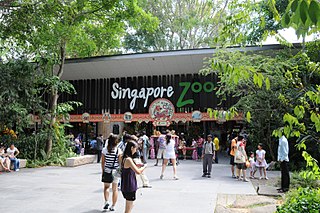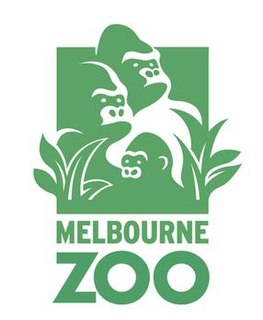
Marwell Zoo is a 140-acre (57 ha) zoo situated in Colden Common near Winchester, in the English county of Hampshire. It is owned and run by the registered charity Marwell Wildlife. The zoo is home to 1,208 animals of 149 species. The charity undertakes a range of educational and conservation activities, with a particular focus on Africa in addition to work from its base.

Twycross Zoo is a medium to large zoo near Norton Juxta Twycross, Leicestershire. The zoo has the largest collection of monkeys and apes in the Western World, and in 2006 re-launched itself as "Twycross Zoo – The World Primate Centre".

The Singapore Zoo, formerly known as the Singapore Zoological Gardens or Mandai Zoo, is a 28 hectares zoo located on the margins of Upper Seletar Reservoir within Singapore's heavily forested central catchment area. Opened in 1973, the zoo was built at a cost of $9 million that was granted by the government of Singapore.

The Philadelphia Zoo, located in the Centennial District of Philadelphia, on the west bank of the Schuylkill River, is the first true zoo in the United States. It was chartered by the Commonwealth of Pennsylvania on March 21, 1859, but its opening was delayed by the Civil War until July 1, 1874. The zoo opened with 1,000 animals and an admission price of 25 cents. For a brief time, the zoo also housed animals brought over from safari on behalf of the Smithsonian Institution, which had not yet built the National Zoo.

Perth Zoo is a 17-hectare (41-acre) zoological park in South Perth, Western Australia. The zoo first opened in 1898 and by 2011 housed 1258 animals of 164 species and an extensive botanical collection. It is a full institutional member of the Zoo and Aquarium Association (ZAA) and the World Association of Zoos and Aquariums (WAZA).

Zoo Atlanta is an Association of Zoos and Aquariums (AZA) accredited zoological park in Atlanta, Georgia. The current president and CEO of Zoo Atlanta is Raymond B. King.

Melbourne Zoo is a zoo in Melbourne, Australia. It is located within Royal Park in Parkville, approximately 4 kilometres (2.5 mi) north of the centre of Melbourne. It is the primary zoo serving Melbourne. The zoo contains more than 320 animal species from Australia and around the world, and is accessible via Royal Park station on the Upfield railway line, and is also accessible via tram routes 58 and 19, as well as by bicycle on the Capital City Trail. Bicycles are not allowed inside the zoo itself.

Apenheul Primate Park is a zoo in Apeldoorn, Netherlands. It specializes in apes and monkeys. It opened in 1971 and was the first zoo in the world where monkeys could walk around freely in the forest and between the visitors. It started with just a few species, now it displays more than 30 different primates, among them bonobo, gorilla and orangutan.

Blackpool Zoo is a 32-acre (13 ha) zoo, owned by Parques Reunidos and located in the sea-side resort of Blackpool, Lancashire, England. It provides a home to over 1,350 animals from all over the world.

Colchester Zoo is a zoological garden situated near Colchester, England. The zoo opened in 1963 and celebrated its 50th anniversary on 2 June 2013. It is home to many rare and endangered species, including big cats, primates and birds as well as many invertebrates and fish species.

ABQ BioPark Zoo, located in Albuquerque, New Mexico, is a facility of the Albuquerque Biological Park. Founded in 1927, the 64-acre (26 ha) and located within the Albuquerque Biological Park, the zoo was originally known as the Rio Grande Zoo until it was renamed to its current name. Some of the most popular of the over 200 species are penguins, chimpanzees, gorillas, orangutans, elephants, polar bears, giraffes, hippos, camels, tamarins, koalas, Mexican wolves, cougars, monkeys, jaguars, zebras, and rhinos. Sections of the zoo include an Africa exhibit area, an Australia exhibit area, the "Cat Walk" and herpetology area. An endangered species carousel was added in 2016. A narrow-gauge railroad connects the zoo to the other facilities of the Albuquerque Biological Park. Walking distance through the zoo is 2.27 miles (3.65 km).

The American Species Survival Plan or SSP program was developed in 1981 by the (American) Association of Zoos and Aquariums to help ensure the survival of selected species in zoos and aquariums, most of which are threatened or endangered in the wild.
The Welsh Mountain Zoo is a zoological garden located near the town of Colwyn Bay in Conwy County Borough, Wales. The zoo was opened on 18 May 1963 by the wildlife enthusiast and naturalist Robert Jackson. The zoo covers an area of 37 acres (15 ha).

Zoo & Botanical Garden of the Capital is the oldest zoo park in Hungary and one of the oldest in the world.

Tasmania Zoo is a zoo located in Launceston, in the Australian state of Tasmania. Situated on 900 acres (360 ha) of old growth native bushland, it is home to the state's largest collection of native and exotic animals. Tasmania Zoo is a member of the Zoo and Aquarium Association, working closely with all Australasian zoos, and are involved in various species management programs. Tasmania Zoo is fully accredited by the Zoo and Aquarium Association.

Banham Zoological Gardens is a 50-acre (20 ha) zoo in Banham, Norfolk, England. The zoo itself, which today is home to more than 2,000 animals, opened to the public in 1968, became a charity in 2013, and has since been often awarded the prize of Norfolk's Top Attraction, by numerous different organisations, with an annual visitor attendance of in excess of 200,000 people. It is part of the Zoological Society of East Anglia, a registered charity which also owns Africa Alive! near Lowestoft, Suffolk.

La Vallée des Singes is a primate park in Romagne, France.

Le Cornelle is a zoo and amusement park in Valbrembo, in the Lombardy province, northern Italy, created by Angelo Ferruccio Benedetti in 1981; extending over an area of 100,000 square metres.

Jawa Timur Park, commonly known as Jatim Park, East Java Park, Eastern Java Park, or JTP, is a complex of recreational and learning parks located in Batu, East Java, Indonesia. The complex has 3 parks, Jatim Park 1, Jatim Park 2, and Jatim Park 3. Jatim Park is one of the tourism icons of East Java and one of the most famous amusement parks in Indonesia.

















